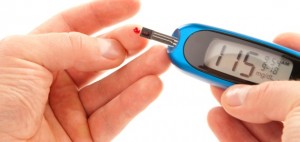 This can lead to two life-threatening conditions:
This can lead to two life-threatening conditions:
Hyper-osmolar hyperglycemic state (HHS) can occur when your blood sugar rises (usually over 600 mg/dL) and you are severely dehydrated. This happens usually when you are sick or stressed. Elderly people are at high risk for this. It can lead to coma or death.You have signs and symptoms of high blood sugar if you are thirsty, must urinate a lot, have a headache, feel weak or drowsy, and cannot speak.
Test your blood sugar if symptoms appear. Drink fluids if you can. Call your healthcare provider immediately.
Ketoacidosis happens when a lack of insulin causes acids called ketones to build up in your blood. This poisons your body. It usually occurs in people with type 1 diabetes. The symptoms come on slowly. They include:
• Dry mouth
• Thirst
• Nausea
• Blurred vision
• Confusion
• Abdominal pain
• Rapid breathing and sometimes a fruity odor on your breath
• Frequent urination
If you develop these symptoms, test your blood sugar. Call your healthcare provider if your blood sugar is more than 250 mg/dL. Also, get help if a home ketone test finds ketones in your urine.
Drink a lot of sugar-free fluids if you think you may have ketoacidosis. Continue checking your blood sugar every three to four hours, or until you see your healthcare provider.
Complications
heart disease, kidney damage, skin conditions, infections, high blood sugar, gum disease, rashes
Good blood sugar control can reduce your risk of many complications:
Heart disease. If you have diabetes, you are 2 to 3 times more likely to have heart disease or a stroke. In fact, heart disease is the leading cause of death among people with diabetes.
Eye disorders. People with diabetes are at risk for cataract, glaucoma, and retinopathy (problems with the retina), which may cause blindness.
Kidney damage. About 20% to 40% of people with diabetes develop kidney disease, which could lead to kidney failure.
Nerve damage.This shows up as numbness or tingling in the feet. You may not feel pain from sores, which can worsen and lead to infection. Nerve damage in people with diabetes is a major cause of amputations. It also can lead to sexual problems, low blood pressure and stomach or intestinal problems.
Skin conditions. High blood sugar levels can thin your skin. This may cause infections, rashes, discoloration, and other conditions.
Infections.If you have high blood sugar, your body has a harder time fighting infections. These usually show up in the bladder, kidneys, vagina, gums, feet, and skin.
Gum disease. Because infections are harder to fight, you’re more likely to develop gum disease.
There’s good news here.When you manage your diabetes well, you can reduce the risk of these complications.



